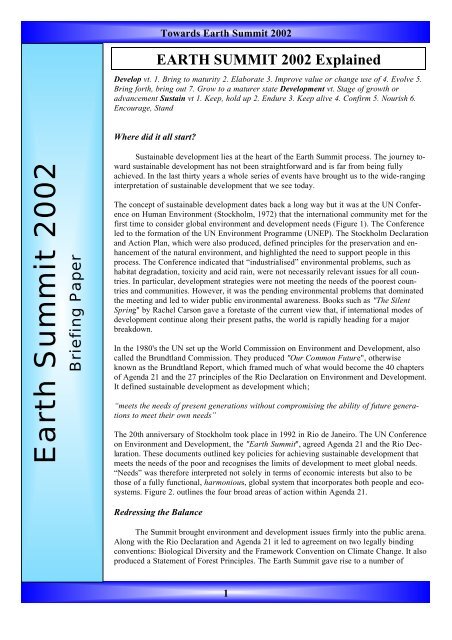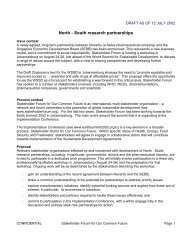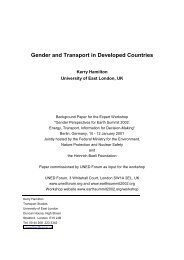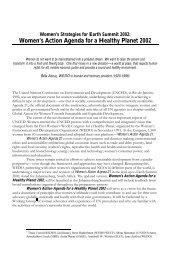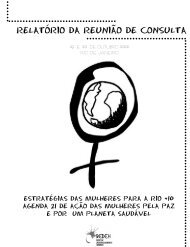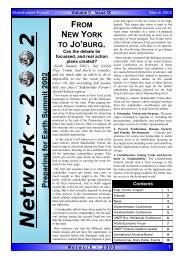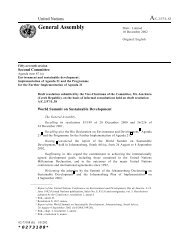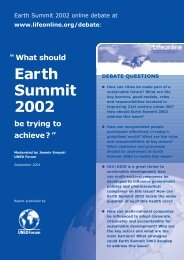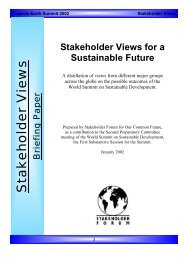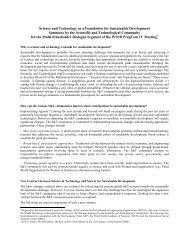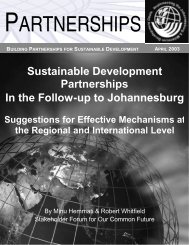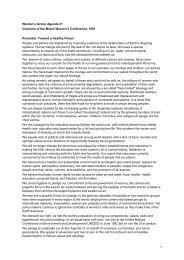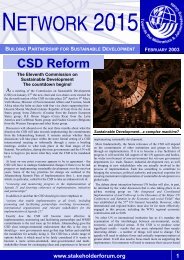About Earth Summit 2002
About Earth Summit 2002
About Earth Summit 2002
Create successful ePaper yourself
Turn your PDF publications into a flip-book with our unique Google optimized e-Paper software.
Towards <strong>Earth</strong> <strong>Summit</strong> <strong>2002</strong><br />
EARTH SUMMIT <strong>2002</strong> Explained<br />
Develop vt. 1. Bring to maturity 2. Elaborate 3. Improve value or change use of 4. Evolve 5.<br />
Bring forth, bring out 7. Grow to a maturer state Development vt. Stage of growth or<br />
advancement Sustain vt 1. Keep, hold up 2. Endure 3. Keep alive 4. Confirm 5. Nourish 6.<br />
Encourage, Stand<br />
Where did it all start?<br />
<strong>Earth</strong> <strong>Summit</strong> <strong>2002</strong><br />
Briefing Paper<br />
Sustainable development lies at the heart of the <strong>Earth</strong> <strong>Summit</strong> process. The journey toward<br />
sustainable development has not been straightforward and is far from being fully<br />
achieved. In the last thirty years a whole series of events have brought us to the wide-ranging<br />
interpretation of sustainable development that we see today.<br />
The concept of sustainable development dates back a long way but it was at the UN Conference<br />
on Human Environment (Stockholm, 1972) that the international community met for the<br />
first time to consider global environment and development needs (Figure 1). The Conference<br />
led to the formation of the UN Environment Programme (UNEP). The Stockholm Declaration<br />
and Action Plan, which were also produced, defined principles for the preservation and enhancement<br />
of the natural environment, and highlighted the need to support people in this<br />
process. The Conference indicated that “industrialised” environmental problems, such as<br />
habitat degradation, toxicity and acid rain, were not necessarily relevant issues for all countries.<br />
In particular, development strategies were not meeting the needs of the poorest countries<br />
and communities. However, it was the pending environmental problems that dominated<br />
the meeting and led to wider public environmental awareness. Books such as "The Silent<br />
Spring" by Rachel Carson gave a foretaste of the current view that, if international modes of<br />
development continue along their present paths, the world is rapidly heading for a major<br />
breakdown.<br />
In the 1980's the UN set up the World Commission on Environment and Development, also<br />
called the Brundtland Commission. They produced "Our Common Future", otherwise<br />
known as the Brundtland Report, which framed much of what would become the 40 chapters<br />
of Agenda 21 and the 27 principles of the Rio Declaration on Environment and Development.<br />
It defined sustainable development as development which;<br />
“meets the needs of present generations without compromising the ability of future generations<br />
to meet their own needs”<br />
The 20th anniversary of Stockholm took place in 1992 in Rio de Janeiro. The UN Conference<br />
on Environment and Development, the "<strong>Earth</strong> <strong>Summit</strong>", agreed Agenda 21 and the Rio Declaration.<br />
These documents outlined key policies for achieving sustainable development that<br />
meets the needs of the poor and recognises the limits of development to meet global needs.<br />
“Needs” was therefore interpreted not solely in terms of economic interests but also to be<br />
those of a fully functional, harmonious, global system that incorporates both people and ecosystems.<br />
Figure 2. outlines the four broad areas of action within Agenda 21.<br />
Redressing the Balance<br />
The <strong>Summit</strong> brought environment and development issues firmly into the public arena.<br />
Along with the Rio Declaration and Agenda 21 it led to agreement on two legally binding<br />
conventions: Biological Diversity and the Framework Convention on Climate Change. It also<br />
produced a Statement of Forest Principles. The <strong>Earth</strong> <strong>Summit</strong> gave rise to a number of<br />
1
Figure 1. Steps to <strong>Earth</strong> <strong>Summit</strong> <strong>2002</strong><br />
Towards <strong>Earth</strong> <strong>Summit</strong> <strong>2002</strong><br />
UN Sustainable Development Process<br />
Key Events<br />
1972 UN Conference on Human Environment (Stockholm)<br />
UNEP established<br />
1983 World Commission on Environment and Development<br />
Brundtland Commission set up<br />
1982 UNEP’s first high level meeting<br />
1989 Brundtland Report “Our Common Future” 1991 Children’s <strong>Summit</strong> (New York)<br />
1992 UN Conference on Environment and Development - the<br />
“<strong>Earth</strong> <strong>Summit</strong>” (in Rio de Janeiro). UN Commission on<br />
Sustainable Development (CSD) established<br />
1993 – 1997 UN CSD first five year programme<br />
1997 Rio <strong>Summit</strong> + 5 review<br />
1992 Framework Convention on Climate Change (FCCC)<br />
and Convention on Biological Diversity agreed<br />
1993 Human Rights <strong>Summit</strong> (Vienna)<br />
1994 Population <strong>Summit</strong> (Cairo)<br />
Convention on Desertification adopted<br />
1995 Social <strong>Summit</strong> (Copenhagen)<br />
Women’s <strong>Summit</strong> (Beijing)<br />
World Trade Organisation (WTO) established<br />
Migratory and straddling fish stocks adopted<br />
1996 Human Settlements (Istanbul)<br />
Food <strong>Summit</strong> (Rome)<br />
1998 Convention on Prior Informed Consent adopted<br />
1998 - 2001 CSD second five year programme<br />
Overarching theme: poverty eradication, sustainable<br />
production and consumption<br />
2001 CSD 10 Global Preparatory Committee 1<br />
Organisational Issues, defining modalities of process<br />
National, Sub regional and Regional preparatory meetings<br />
<strong>2002</strong> Global Prep Comm. 2 (28 th Jan - 8 th Feb, New York)<br />
Substantive review (major group input)<br />
Global Prep Comm. 3 (25 th Mar - 5 th April, New York)<br />
Finalise review (major group input)<br />
Global Prep Comm. 4 (27 th May – June 7 th , Indonesia)<br />
Identification of priority issues (2 day major group input)<br />
1999 Cairo + 5 (Population)<br />
Kyoto Protocol on Climate Change adopted<br />
2000 Beijing + 5 (Women)<br />
Copenhagen + 5 (Social)<br />
Millennium <strong>Summit</strong> (New York)<br />
World Youth Forum (Dakar)<br />
Biosafety Protocol adopted<br />
2001 UNEP 21st Governing Council (Kenya, February)<br />
UN Third Conference on Less Developed Countries<br />
(Brussels, May)<br />
Istanbul + 5 (Human Settlements, June)<br />
New York + 10 (Children)<br />
World Food <strong>Summit</strong> (Italy, November)<br />
International Conference on Freshwater (Bonn,<br />
December)<br />
?WTO negotiations, including GATS and agriculture<br />
<strong>2002</strong> Financing for Development, high level conference<br />
(Mexico, March)<br />
WORLD SUMMIT ON SUSTAINABLE DEVELOPMENT (Rio’ <strong>Earth</strong> <strong>Summit</strong> +10)<br />
Johannesburg, South Africa. Monday 26 th August — 6 th September <strong>2002</strong><br />
The UN World <strong>Summit</strong> on Sustainable Development defining national, regional and global commitments.<br />
Including half-day dialogue with major groups.<br />
Beyond the <strong>Summit</strong> …<br />
2
positive responses including the emergence of thousands of Local Agenda 21 initiatives and an enhanced political<br />
profile of environmental issues. It led to the formation of the Commission for Sustainable Development (CSD) and<br />
many countries set up sustainable development commissions and national strategies for sustainable development.<br />
However, the description of sustainable development in Agenda 21 called for total shift in the status quo of prevalent<br />
value systems and institutional processes. Such global change could never have occurred over night. When progress<br />
was assessed at Rio + 5 (New York, 1997) a number of gaps were identified, particularly with regard to social equity<br />
and poverty. This was largely reflected by falling levels of official development assistance (ODA) and growing international<br />
debt, along with failures to improve: technology transfer; capacity building for participation and development;<br />
institutional coordination; and reduce excessive levels of production and consumption. The review meeting<br />
called for the ratification, reinforcement and stronger implementation of the growing number of international agreements<br />
and conventions which refer to environment and development.<br />
Figure 2. Elements of Agenda 21<br />
Towards <strong>Earth</strong> <strong>Summit</strong> <strong>2002</strong><br />
Elements<br />
Social and Economic dimensions to development<br />
Conservation and management of natural resources<br />
Strengthening role of Major Groups<br />
Means of Implementation<br />
Issues<br />
Poverty, Production and Consumption, Health, Human Settlement,<br />
Integrated Decision - Making<br />
Atmosphere, Oceans and Seas, Land, Forests, Mountains, Biological<br />
Diversity, Ecosystems, Biotechnology, Freshwater resources, Toxic<br />
Chemicals, Hazardous Radioactive and Solid Wastes<br />
Youth, Women, Indigenous Peoples, Non-Government Organisations,<br />
Local Authorities, Trade Unions, Business, Scientific and Technical<br />
Communities, Farmers<br />
Finance, Technology transfer, Information, Public Awareness, Capacity<br />
Building, Education, Legal Instruments, Institutional Frameworks<br />
Building Momentum<br />
Between 2nd– 5th May 2001, proceeding the ninth session of the CSD, the first global preparatory committee<br />
(Prep Comm. 1.) for the <strong>Summit</strong> took place to begin to define the modalities of the various processes in the run up to<br />
the summit, as well as for the <strong>Summit</strong> itself. The date for <strong>Earth</strong> <strong>Summit</strong> <strong>2002</strong> has now been set for 26 th August - 6 th<br />
of September <strong>2002</strong>, to take place in Johannesburg, South Africa. The Preparations for the <strong>Summit</strong> will take place at<br />
local, national, sub-regional, regional and global levels, with the official UN platforms at national, regional and<br />
global levels (Figures 3 and 4). Unlike the 1997 review, the <strong>Earth</strong> <strong>Summit</strong> <strong>2002</strong> process is undertaking a review of<br />
progress in advance of the <strong>Summit</strong>. This is with the hope that people will arrive at the <strong>Summit</strong> ready to identify steps<br />
to take critical and more problematic areas forward. Donor governments have been requested to further support developing<br />
country participation in the process. Numerous reports from different UN bodies are underway to supplement<br />
the review process, including UNEP’s Global Environment Outlook, UNDP’s Human Development Report,<br />
WHO’s World Health Report, World Bank’s World Development Report, IFAD’s Rural Poverty Report, UNESCO’s<br />
World Water Development Report. Also governments have agreed to take account of the outcomes of relevant international<br />
processes, including the third Conference for Least Developed Countries, Financing for Development Conference,<br />
Conference of the Parties for the various UN global conventions.<br />
Possible Outcomes<br />
A minimal outcome of the <strong>Summit</strong> is that it will provide an opportunity to strengthen the global commitments<br />
on sustainable development. This includes ratification of agreements, such as the Kyoto and Biosaftey Protocols,<br />
along with other outstanding agreements, such as Persistent Organic Pollutants and on Migratory and Straddling Fish<br />
Stocks. In addition governments could make specific commitments towards progressing the Millennium Development<br />
Goals e.g. health, gender, children, water, poverty, health and education targets. Johannesburg creates the opportunity<br />
to define integrated and time bound plans and strategies to meeting these agreements over the next five, ten<br />
and fifteen years.<br />
3
Figure 3. Dates and locations of preparatory meetings<br />
Towards <strong>Earth</strong> <strong>Summit</strong> <strong>2002</strong><br />
Area Meeting Location & Date<br />
Latin America<br />
and Caribbean<br />
Eminent Persons Round<br />
Table<br />
Sub-regional Preparatory<br />
Meetings<br />
Bridgeport, Barbados, 18-20 June 2001<br />
Southern Cone, Santiago Chile, 14-15 June 2001<br />
Caribbean, Havana, Cuba, 28-29 June 2001<br />
Andean Zone, Quito, Ecuador 2-3 July 2001<br />
Meso-American (Central America, Mexico), San Salvador, El Salvador 17-<br />
18 July 2001<br />
Regional Prep Comm. Rio de Janeiro, Brazil, 23-24 October 2001<br />
Europe and<br />
North America<br />
Eminent Persons Round<br />
Table<br />
Sub-regional Preparatory<br />
Meetings<br />
Vail, Colorado, USA 6-8 June 2001<br />
European Prep Comm. ECE member Geneva, 12-13 July 2001<br />
Central and Eastern Europe, Bucharest, Romania, 27-28 June 2001<br />
Regional Prep Comm. Geneva, Switzerland, 24-25 September 2001<br />
Africa<br />
Eminent Persons Round<br />
Table<br />
Sub-regional Preparatory<br />
Meetings<br />
Cairo, Egypt 25-27 June 2001<br />
South Africa: Port Louis, Mauritius, 17 –19 September 2001<br />
Northern Africa: Tunis, Tunisia, 5-7 September 2001<br />
East Africa: Nairobi, Kenya, 10-12 September 2001<br />
Central Africa: Libreville, Gabon, 17-19 September 2001<br />
West Africa: Abidjan, Cote d’Ivoire, 1– 3 October 2001<br />
Regional Prep Comm. Nairobi, Kenya, 6-9 November 2001<br />
Asia and Pacific<br />
Eminent Persons Round<br />
Tables<br />
Sub-regional Preparatory<br />
Meetings<br />
Regional Prep Comm.<br />
West Asia: Lebanon 9-11 April 2001<br />
East Asia and the Pacific: Kuala Lumpur, Malaysia, 9-11 July 2001<br />
Central and South Asia: Bishkek, Kyrgystan, 30 July-1 August 2001<br />
Western Asia: Bahrain, 23-25 September 2001<br />
Northeast Asia: Beijing, China, 26-28 July 2001<br />
Southeast Asia: Manila, Philippines, 17-19 October 2001<br />
Central Asia: Almaty, Kazakhstan, 19-21 September 2001<br />
South Asia: Colombo, Sri Lanka, 27-29 September 2001<br />
Pacific: Apia, Samoa, 5-7 September 2001<br />
West Asia: Cairo, Egypt, 24-25 October 2001<br />
Asia and Pacific: Phnom Penh, Cambodia, 27-29 November 2001<br />
Prep Comm. 2 New York, 28 th Jan - 8 th Feb <strong>2002</strong><br />
Global<br />
Prep Comm. 3 New York, 25 th March – 5 th April <strong>2002</strong><br />
Prep Comm. 4 Bali, Indonesia, 27 th May - 7 th June <strong>2002</strong><br />
<strong>Earth</strong> <strong>Summit</strong> <strong>2002</strong> Jo’ burg, South Africa, 26 th August—6th September <strong>2002</strong><br />
4
Figure 4. Activities during preparatory meetings<br />
Activities<br />
Towards <strong>Earth</strong> <strong>Summit</strong> <strong>2002</strong><br />
National<br />
2000 - Summer 2001<br />
Regional<br />
Summer - Winter<br />
2001<br />
Global<br />
2001 - Summer <strong>2002</strong><br />
National preparations will coordinated by national multi-stakeholder committees for sustainable development<br />
- to begin to define national agendas and undertake a review of progress. Public consultations and<br />
meetings, previous National Reports to the CSD and National Strategies for Sustainable Development will<br />
all help to inform this process. The UN CSD has suggested 4 national activities, also countries are asked to<br />
define 4- 5 national targets to take domestic sustainable development forward.<br />
Regional meetings of governments and other major groups will seek to build consensus over critical<br />
issues for progressing regional sustainable development - identifying areas of priority action and highlighting<br />
examples of best practice. The processes will be informed by roundtables of regional experts, which<br />
will seek to highlight problems, solutions and priorities, as well as to set targets. Sub-regional processes<br />
may also contribute to this process, where they are being arranged in advance of the regional meeting. Regional<br />
meetings will take place in: Latin America & Caribbean (Rio de Janeiro, October), Africa<br />
(Nairobi, November), Europe & North America (Geneva, September), West Asia (Egypt, October), Asia<br />
& Pacific (Cambodia, November)<br />
The first Global Preparatory Committee (Prep Comm. I, May 2nd—5th 2001) on summit modalities. Prep<br />
Comm. 2 (28 th Jan - 8 th Feb, New York) is the substantive review and includes major group input, as<br />
well as financial institutions and GEF. The UN Secretary General will produce a global report on progress<br />
as well as reports on the outcomes of the regional and national review processes. Prep Comm. 3 (25 th<br />
Mar - 5 th April, New York) will finalise review, defining lessons learnt & existing constraints to implementation.<br />
It will set a provisional agenda. for the summit. Prep Comm. 4 (27 th May - June 7 th , Indonesia)<br />
will be a high level ministerial event to identify the priority issues for the summit. It includes two days<br />
of multi-stakeholder dialogues. Johannesburg <strong>Summit</strong> (26th August- 6th September, South Africa)<br />
The plenary is proposed to have two halves. In the first half delegates and civil society participants will<br />
address organisational issues and undertake partnership events. In the second, Heads of State will debate<br />
and a multi-stakeholder event will be convened. The Main Committee will meet in parallel to negotiate<br />
outstanding elements of a draft text for the Johannesburg Declaration.<br />
The <strong>Summit</strong> also creates an opportunity to address critical questions facing international institutions, such as the UN<br />
family, Bretton Woods Institutions (World Bank/International Monetary Fund) and World Trade Organisation, as regards<br />
their role in meeting globally sustainable development, as well as to address the cross-over and complimentarity<br />
between different international, regional, national and local bodies. The <strong>Summit</strong> will not only address Agenda 21<br />
but also tackle new, critical issues that are facing the world in a new century of wholesale globalisation. Key issues<br />
will include aspects relating to greater accountability, equity and justice for sustainable ends. Similarly it is crucial<br />
that the present lack of public awareness and engagement in Agenda 21 is tackled with renewed vigour. Johannesburg<br />
creates a massive opportunity to form new and positive partnerships between different stakeholder groups for<br />
tackling some of these critical global issues that require an international response. And in order to mobilise implementation,<br />
the <strong>Summit</strong> will have to secure innovative and increased funds for sustainable development. This will include<br />
additional aid, further debt relief and enhanced access to Foreign Direct Investment.<br />
Beyond the <strong>Summit</strong><br />
Time is short. As individuals, we each have a right, a role and a responsibility to contribute to sustainable<br />
development. Clearly the more people and organizations who are willing to contribute to the <strong>Earth</strong> <strong>Summit</strong> process,<br />
and willing to encourage others to do so, the more likely that the process will begin to build momentum and that the<br />
summit can be a starting point for a new level of implementation. Before Rio it was said that;<br />
"while the <strong>Earth</strong> <strong>Summit</strong> will constitute a test of nations willingness to institute fundamental changes in economic<br />
behaviour, the challenges ahead will be far more daunting. Change is seldom easy"<br />
Sustainable development is a dynamic process, and it's one that will continue to evolve and grow as lessons are learnt<br />
and ideas re-examined. By reinvigorating the spirit of Rio we can begin to move to a deeper and broader level of sustainability.<br />
5
Towards <strong>Earth</strong> <strong>Summit</strong> <strong>2002</strong><br />
This paper was written by Rosalie Gardiner as part of Stakeholder Forum ’s<br />
“Towards <strong>Earth</strong> <strong>Summit</strong> <strong>2002</strong> Project”. Updated January <strong>2002</strong>.<br />
For further information contact:<br />
Stakeholder Forum for Our Common Future<br />
c/o UNA-UK, 3 Whitehall Court, London SW1A 2EL UK<br />
Tel: (44) 20 7839 7171 . Fax: (44) 20 7930 5893<br />
Email: rgardiner@earthsummit<strong>2002</strong>.org<br />
Web site: www.earthsummit<strong>2002</strong>.org and www.stakeholderforum.org<br />
For further information on the UN process and how to attend the <strong>Summit</strong><br />
contact the UN Johannesburg <strong>Summit</strong> Secretariat at:<br />
2 UN Plaza, Room DC2-2220, New York, New York 10017 USA.<br />
Tel. (+ 1 212) 963 8811 Fax ( + 1 212) 963 1267<br />
E-mail: dsd@un.org<br />
Web Site: http://www.johannesburgsummit.org<br />
6


